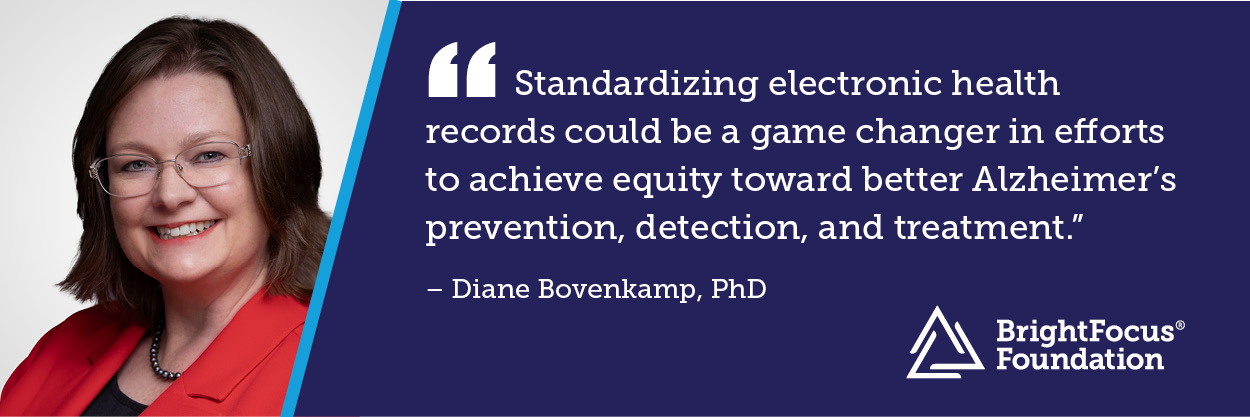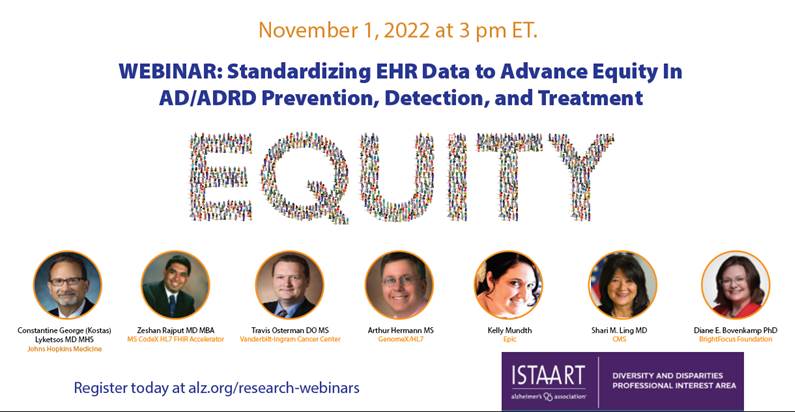Leading the Way to Health Equity Through Better Alzheimer’s Data
Written By: BrightFocus Editorial Staff



Written By: BrightFocus Editorial Staff

In the U.S., racial and ethnic disparities in diagnosing and treating Alzheimer’s disease is a national priority. Blacks and Hispanics are at increased risk for Alzheimer’s compared to non-Hispanic whites, yet data shows that these groups are less likely than whites to be diagnosed with the condition.
A recent article coauthored by BrightFocus Vice President, Scientific Affairs Diane Bovenkamp, PhD, proposes a new way to narrow these racial and ethnic disparities in Alzheimer’s research through the development of standardized electronic health records. This would allow clinicians to collect and share real-world data about Alzheimer’s and related dementias across diverse population groups including race, ethnicity, and geography.
The system, called the Standard Health Record for Dementia (SHRD, pronounced “shared”) would replace the current unstandardized, fragmented, or missing state of key real-world information sharing with an open source, consensus-based, and interoperable common data standard. SHRD could be used to advance equity by strengthening public health surveillance by facilitating Alzheimer’s and related dementias registry reporting, improving case detection and staging, and diversifying participation in clinical trials.
“Standardizing electronic health records to improve the accuracy, speed, and diversity of patient recruitment could be a game changer in efforts to achieve equity toward better Alzheimer’s prevention, detection, and treatment,” Dr. Bovenkamp said.
SHRD was modeled after a similar open-source standard health record for oncology— mCODE™ (short for Minimal Common Oncology Data Elements), where one of the founding collaborators was The MITRE Corporation, which is now the driving force behind the creation of SHRD (including the paper’s corresponding author, Dr. Elaine Swift). Since its launch in 2018, mCODE has been adopted by leading health systems and electronic health record vendors to improve overall cancer data quality for patient care and research.
The article, “Standardizing Electronic Health Record Data on AD/ADRD to Accelerate Health Equity in Prevention, Detection, and Treatment,” was published in the Journal of Prevention of Alzheimer’s Disease. Its coauthors include scholars from Johns Hopkins University School of Medicine (including lead author and BrightFocus grantee Dr. Kostas Lyketsos), the LEAD Coalition (Leaders Engaged on Alzheimer’s Disease), the Alzheimer’s Drug Discovery Foundation, and the Banner Alzheimer’s Institute/University of Arizona College of Medicine.

BrightFocus Foundation is a premier global nonprofit funder of research to defeat Alzheimer’s, macular degeneration, and glaucoma. Through its flagship research programs — Alzheimer’s Disease Research, Macular Degeneration Research, and National Glaucoma Research— the Foundation has awarded nearly $300 million in groundbreaking research funding over the past 51 years and shares the latest research findings, expert information, and resources to empower the millions impacted by these devastating diseases. Learn more at brightfocus.org.
Disclaimer: The information provided here is a public service of BrightFocus Foundation and is not intended to constitute medical advice. Please consult your physician for personalized medical, dietary, and/or exercise advice. Any medications or supplements should only be taken under medical supervision. BrightFocus Foundation does not endorse any medical products or therapies.
